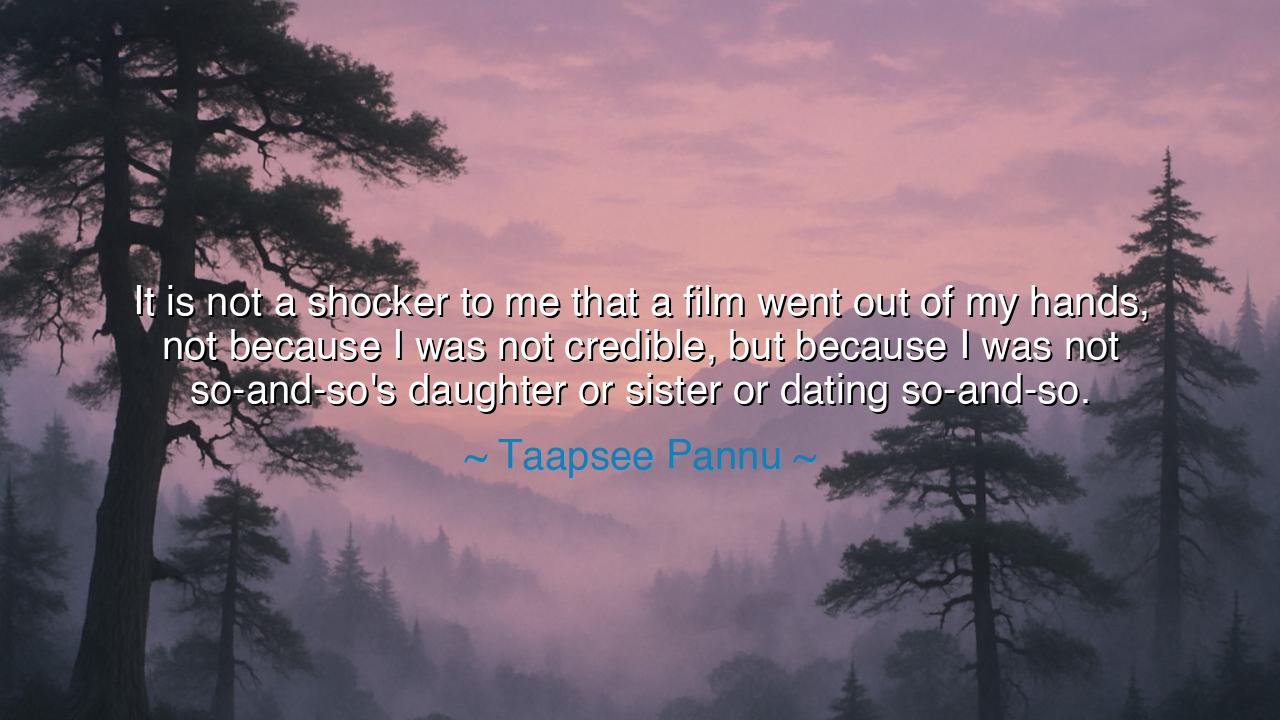
It is not a shocker to me that a film went out of my hands, not
It is not a shocker to me that a film went out of my hands, not because I was not credible, but because I was not so-and-so's daughter or sister or dating so-and-so.






Hear now the resolute and unyielding words of Taapsee Pannu, who said: “It is not a shocker to me that a film went out of my hands, not because I was not credible, but because I was not so-and-so’s daughter or sister or dating so-and-so.” Though spoken in the language of the modern age, her words carry the spirit of the ancients—the cry of the self-made soul in a world ruled by inheritance and favor. She speaks not only of cinema, but of injustice, of how the doors of power are often guarded not by merit, but by lineage. In this single reflection lies the eternal struggle between those who are chosen by privilege and those who must choose themselves.
The origin of this quote arises from the heart of the film industry—where dreams are currency and access often outweighs ability. Taapsee Pannu, a woman who carved her own path without the shelter of a famous family name, has lived the quiet war of every outsider. Her words are born of experience, but they are also born of defiance. They echo the cry of all who have been denied their place not for lack of skill, but because they did not belong to the right bloodline. Yet she does not speak with bitterness, but with clarity—for to see truth without illusion is the beginning of strength.
The ancients, too, knew of this struggle. In every age, the gates of opportunity have been guarded by the few, while the many knock in vain. In Athens, Socrates was scorned by those of noble birth, his wisdom dismissed because he came not from wealth but from craft. In India, the humble Valmiki, born of no noble house, rose to become the poet-saint who wrote the Ramayana, a work that outlasted empires. Their lives remind us that true greatness often comes not from inheritance, but from inner fire—a flame that neither rejection nor injustice can extinguish.
Pannu’s lament about the loss of a film is not just about art—it is about recognition. When she says she was passed over “not because I was not credible,” she speaks the anguish of the capable ignored, the talented unseen. It is the wound of merit dismissed before it can even be measured. Yet her tone reveals not defeat, but acceptance born of understanding. She knows that in such a world, fairness is a myth—but perseverance is a weapon. Where privilege opens doors, persistence breaks them down.
This truth applies beyond cinema, to every realm where the few hold power over the many. In the courts of kings, in the halls of commerce, in the corridors of art—the pattern endures. Those with connections are born into visibility; those without must forge their light through effort. Yet history shows that the self-made rise higher, for their roots are deeper. They do not bloom from ease, but from struggle. And what is born from struggle cannot be uprooted by circumstance.
Let this teaching reach the hearts of all who labor unseen: the world may favor the inherited, but it rewards the relentless. If opportunity is denied, let that denial become your discipline. If recognition is withheld, let it sharpen your resolve. The tree that grows in the storm learns to stand stronger than the one shielded from wind. So too, the artist who must fight for every role learns the art not only of performance, but of endurance.
Thus, the lesson of Taapsee Pannu’s words is clear: do not measure your worth by the doors that close, but by the strength with which you continue to knock. Honor the work itself, for in the end, merit endures where privilege fades. The names of dynasties may glitter for a moment, but the names of the self-made are carved in the stone of time. So walk your path without apology, children of destiny, and remember—your worth is not inherited; it is earned through the fire of perseverance.






AAdministratorAdministrator
Welcome, honored guests. Please leave a comment, we will respond soon